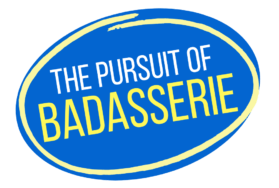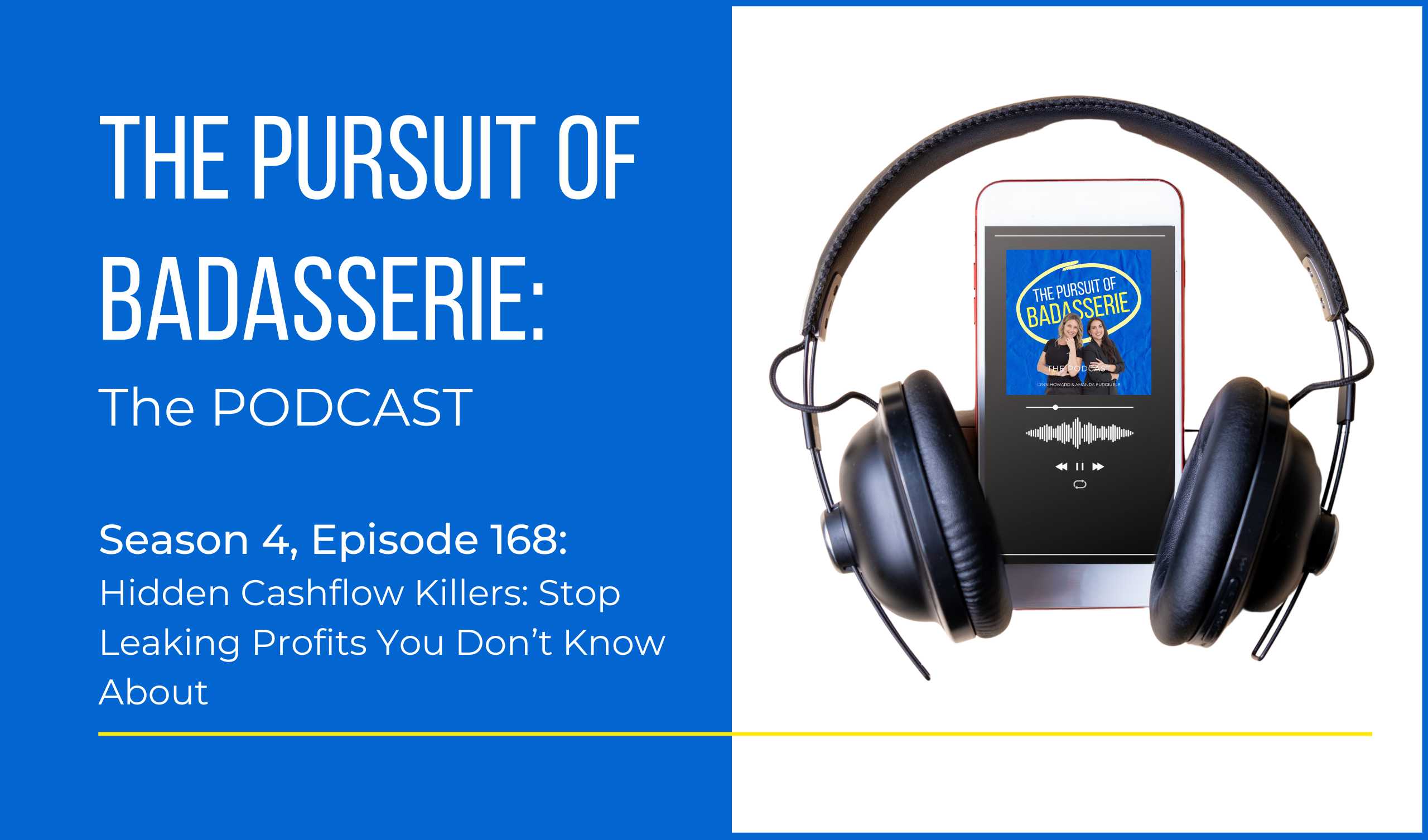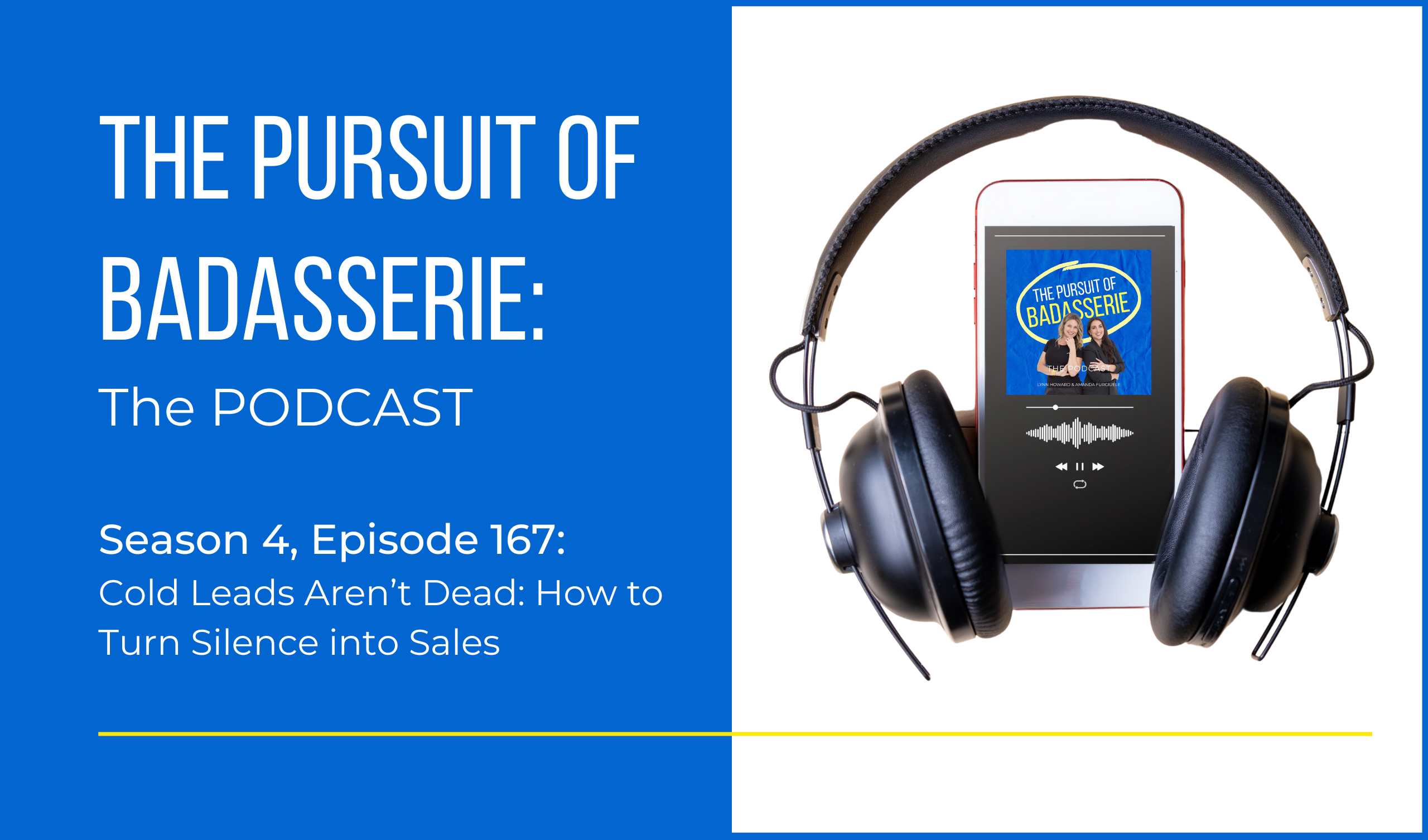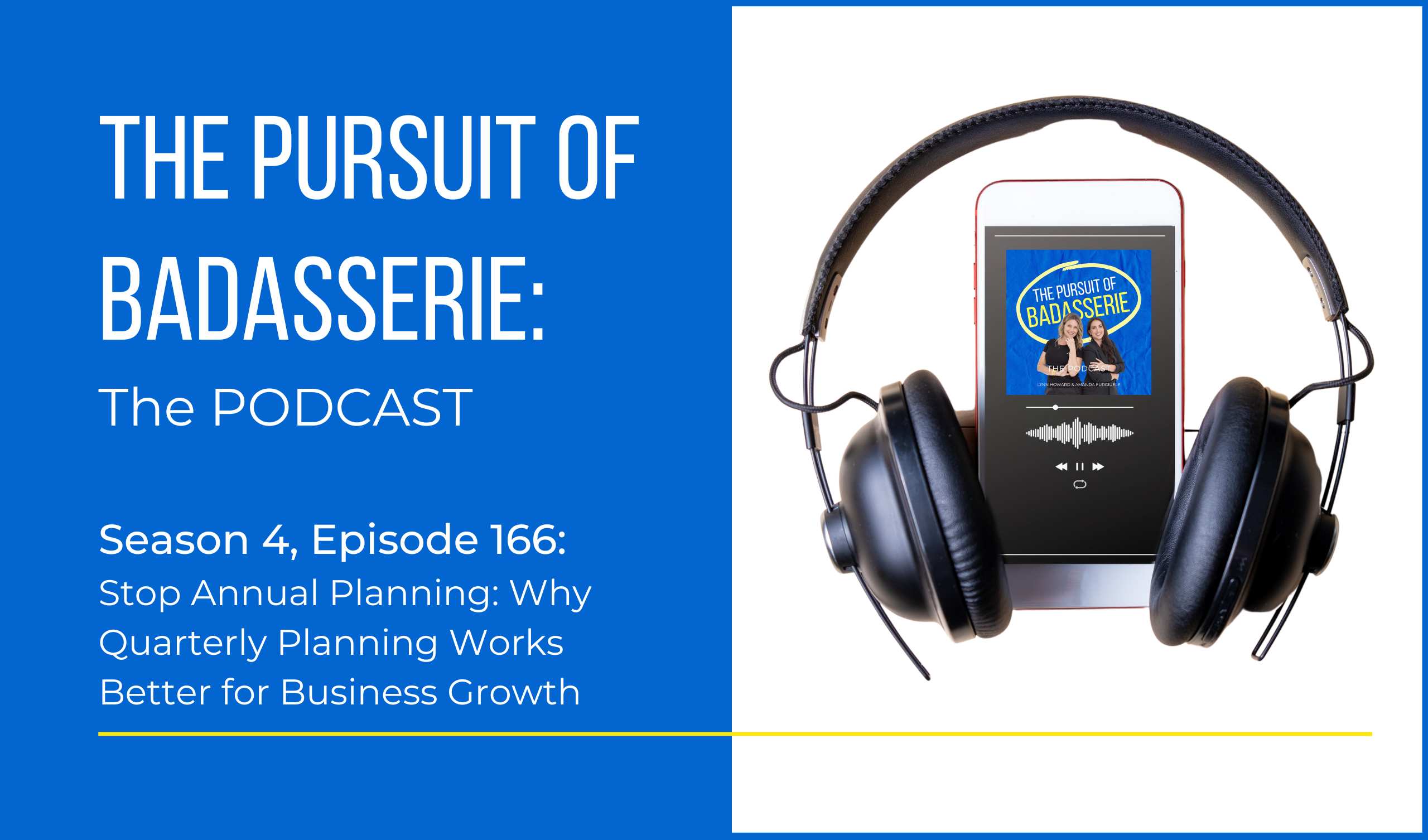Episode 151: No More Excuses: Breaking the Lies That Hold Your Business Back
We all do it — telling ourselves little lies that feel like reasons but are really excuses.
“I’ll get to it tomorrow.”
“I don’t want to sound too salesy.”
“I don’t have the time.”
Sound familiar?
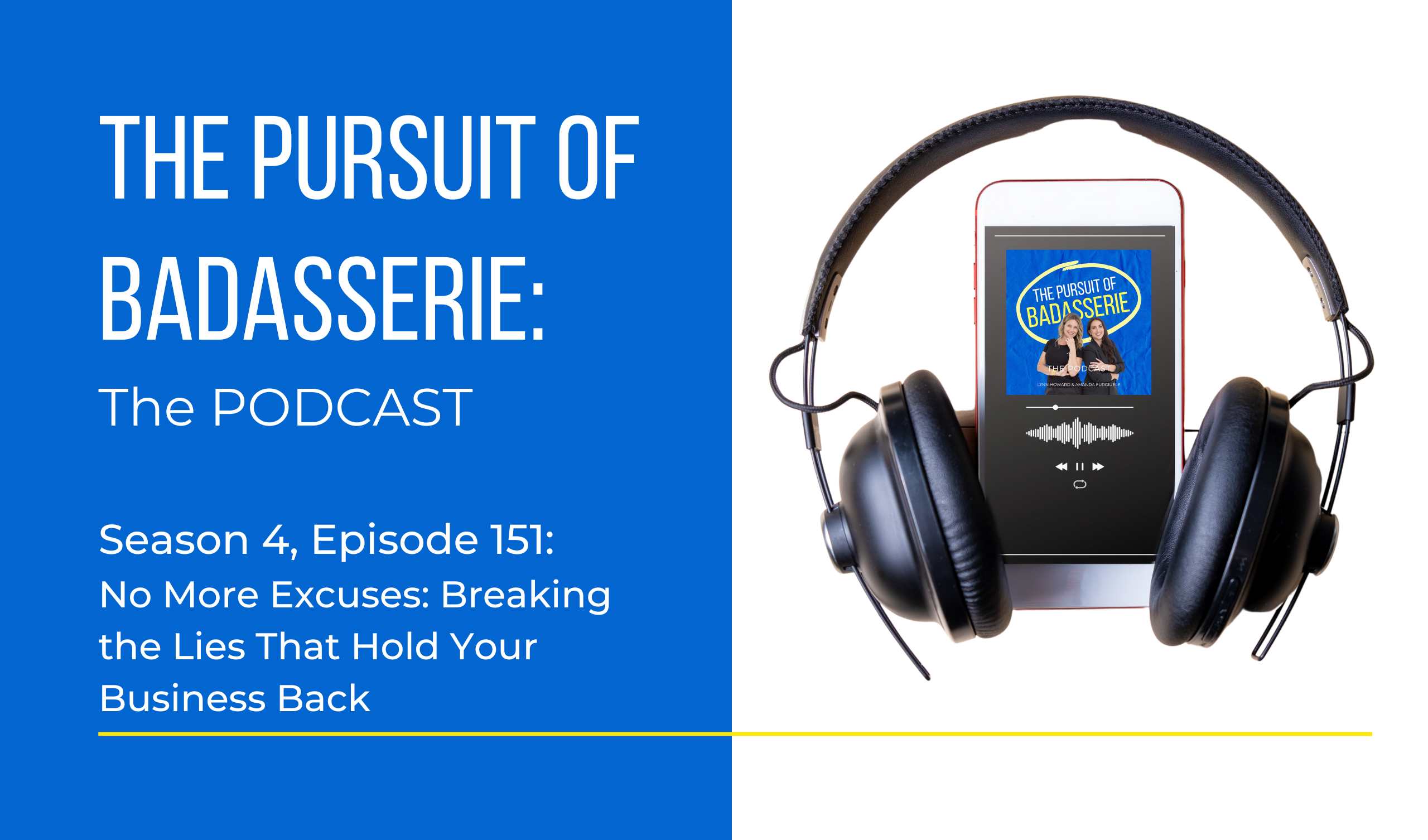
In this episode of The Pursuit of Badasserie: The Podcast, we dig into the excuses we tell ourselves (and others), how they show up as patterns, and why they quietly sabotage your business and life.
From subtle procrastination habits to full-on victim mentality, we explore:
- The fine line between a reason and an excuse (and how one can morph into the other).
- Why excuses often become ingrained patterns and part of your identity.
- Common lies entrepreneurs repeat — “I need to update my website again,” “Nobody’s buying right now,” “I’ll be more consistent once ___.”
- The role fear, imposter syndrome, and avoidance play in keeping you stuck.
- Why admitting you are the problem is actually the most empowering truth.
- How to take a critical eye to your own patterns and start rewriting the story you’ve been telling yourself.
This week’s challenge: Identify ONE excuse or lie you keep telling yourself. Call it out. Then take one small action to break that pattern.
Remember, the only person you’re lying to is yourself. And the good news? You’re also the solution.
If this episode hit home, share it with a fellow entrepreneur who needs the reminder, and don’t forget to like, subscribe, and review wherever you tune in.
Make sure to subscribe to our YouTube or Spotify and leave us a review!
- Like the show? LEAVE US A REVIEW wherever you listen!
- Have a question? CONTACT US at info@thepursuitofbadasserie.com!
- Want to sponsor us? Find out how HERE.
…
Read the full transcript of this episode below:
Lynn Howard:
Hey, I’m Lynn.
Amanda Furgiuele
And I’m Amanda. Welcome to The Pursuit of Badasserie, the podcast. We are back and talking about excuses, the ones you tell yourself and the ones you tell others.
Is that holding you back in your business?
Lynn Howard
Yes. We all have the, what?
Amanda Furgiuele
I was like, I’m going to answer my own question. Is that holding you back in your business? Yes, it is. Yes. Yes.
Lynn Howard
Yeah. We, it’s interesting when we, um, when we decided to do this one, I can think of all of the ones I hear clients, like our clients will say, and some don’t position themselves as excuses, obviously.
We’ve talked a lot about the difference between an excuse and a reason, and how they can change, how they can be interchangeable.
But, you know, at the end of the day, a lot of our clients and even ourselves, and I’ll say, I don’t know if I’d say ourselves, but I will definitely say we’ve dealt with a lot of clients who point the finger outward and have a reason why this doesn’t work, a reason why.
I know that mine is a lot more internal, the excuse I tell myself, not necessarily. And like, I’ll get it tomorrow or I’ll do this or I’ll do that.
Um, and I know we’re going to go over some of the excuses, but that, that resistance, um, to move forward is rooted in, rooted in an excuse of some sort, which is.
Rooted in maybe a fear or imposter syndrome and all of that. So it’s kind of like different layers. But I will also say, too, I feel like it’s kind of become more so just the go-to, right?
Like not even thinking about it just automatically becomes an excuse that’s become the pattern, that’s become the habit and the knowing, if that makes sense.
Amanda Furgiuele
I absolutely think it’s a pattern. I think at some point it shifts because we all, as humans, there’s going to be times that we have excuses and or reasons, or maybe it started as just more of a reason and now it’s evolved into this constant excuse, but I think it gets into a pattern shift.
And that’s why you see a lot of, and I’ll give one of mine that I had from eight years ago of, oh, I’m having a baby, that’s going to affect whether or not I can be a productive entrepreneur.
experience community. what going going Thank you. And that’s something I told myself during my whole pregnancy, and I think it’s what a lot of people tell themselves, this dialogue, and maybe it’s societal, maybe it’s, you know, maybe it’s your family, maybe it’s whatever, but you start to tell yourself that these are the things, like, I’m not, I can’t do this because of this, I can’t do this because I’m a woman, I can’t do this because I, you know, have a kid, I can’t do it because the sun is shining.
Like there’s so many reasons that we are excuses that we make up that become a pattern that becomes part of who we are.
And if you don’t break that pattern, then that is, then that’s how the pattern is going to keep going.
Like you’re going to be that person who couldn’t do it because they had kids because you decided that’s what your story was going to be.
And that’s how you ended up like that’s the narrative you decided is your narrative and it becomes part of who you are.
And that pattern gets so ingrained that you don’t, you can’t extricate it from yourself. It becomes who you are that woe is me.
This is part of my life. And it goes, it feeds straight into that martyr and victim. That’s that you and I struggle to be nice about.
But I think it is a pattern that takes a lot more effort to break than people realize. And so much of it, at least for me, I know for you as well, is internal.
We don’t talk about it very often. We don’t say it aloud. And it’s still there. But the question is, are you going to let it be a pattern that stops you from progressing and moving beyond it?
Or is it just one of those like nagging things in the back of their head that you remind yourself isn’t really truth?
Lynn Howard
Yeah. You know, it’s interesting. I there are a couple of thoughts that came up, including a conversation that we just had about Googling something.
But I’m not going to bring that up. I’ll let you bring that up if you want to. But it’s true.
And but no, that’s that’s one of the topics that came up. But you said go straight into victim mentality.
And I actually want to also address that it’s not always that’s absolutely a lot of. I also want to talk to the people who don’t go into victim mentality that actually set up a pattern of lack of accomplishment and lack of this, but it’s not necessarily, and I’ll throw myself on, on the sake for this one.
I don’t, I personally, one of the excuses I found, I’ll tell myself, especially when I’m exhausted, or I’m just like disconnected is, I’ll put things off, I’ll create all my lists, and I’ll say, I’ll get to that tomorrow, I might have time set up and say, oh, it’s not due yet, I’ll get to that tomorrow, and I’m not falling into victim mode.
But what happens then, is, I’m not getting this stuff done, and I then will either like super crunch it in, or I will just keep avoiding it.
So it’s interesting, because a lot of people do fall into victim mode, but there’s a lot of people who won’t fall into victim mode with the excuses that they’re giving themselves.
So I want to make sure that we see both sides because I can tell you the people who don’t slip into that victim mode and that victim mentality will say, oh, well, this isn’t an excuse because I’m not falling into victim mode.
. You are using this as an excuse or you are using this as a lie that, you know, you have to, and we’ve talked about this, like we have to do things last minute because we’re great at it.
And that’s where we get our most energy and stuff. And that’s not necessarily falling into that victim side. And so, because I feel like, um, those of us who don’t necessarily, I mean, the people who fall into the victim side, a lot of times across the board, we don’t notice the lies or the, the excuses that we’re telling ourselves subconsciously and consciously, um, externally and internally.
So implicit and explicitly, um, we don’t recognize sometimes. Yeah. So we’re just kind of there, maybe after the fact, that has something to do with the lack of self-awareness, the lack of actually the healthy, criticizing oneself and kind of our own ways.
And I say healthy, because I think that there is a healthy way to do it. So first, it’s acknowledging, you know, where you’re lying to yourself.
Like, and this is, again, where’s the resistance and the person that it’s all centered around is always going to be you.
Your life is always centered around you. And so if you’re not accomplishing something, if you’re constantly falling into a certain pattern, that’s you.
So what excuse, if you have acknowledged it, what excuse are you telling yourself to stay in that pattern? Or what excuses and lies have you told yourself to put yourself in?
Amanda Furgiuele
And that’s really hard to sit with, because ultimately, no matter what the excuse, no matter what the reason, no matter what lies you tell yourself, at the end of the day, no matter where you go, there you are.
And I know that’s a really hard one. And that was one that stuck with me for years. And I actually remember the first time I used that term, it was in 2005.
I remember this. So in 2005, I told myself, you know, if you can’t be happy here, you can’t be happy anywhere.
No matter where you go, there you are. So if all of the things you’ve been telling yourself of why things aren’t working out or why things aren’t the way you want them to be, it’s not those circumstances, it’s you.
Because if you remove all of those things, all those excuses, all those, all the places you were. Why don’t we keep running away from whatever it is, and this is like on a larger scale, I mean obviously I tell myself I’ll do it tomorrow all the time, it never actually gets done, I’ll check my email tomorrow, but there are a lot of things that are on a bigger scale that you have to really sit down with yourself and realize that you’re the problem, and I, you’re also the solution though.
Yeah, but you’ve got to be okay and open to that concept because you’re never going to get better if you don’t, you know, admit that you need help and admit that, that it’s, that it’s the problem, so you are the problem, but you’re the solution, and I think that’s, you know, yes it’s depressing to sit in the idea that all these things that aren’t working out are your fault, but you’re, all these things can work out because of you, so it’s both sides of it, and it’s how you choose to see it, and where you choose to sit on that line.
Lynn Howard
Yeah, I agree. It’s interesting when you’re talking, I was thinking about the compounded. So I self-admittedly, emails are the first to go.
And, you know, it’s become this like badge almost. So we’re training ourselves actually how to engage, right? And the thing is, though, is the whole I’ll answer emails tomorrow, like I’m setting myself up for failure, because I know that’s not my priority when maybe it would take 15 minutes to do it now.
Like it’s the do it now. And when I’m when I and I’m talking personally, when I’m not in the when I’m not in the habit, the current habit, because I go in and out of this one of say, I’ll check my email tomorrow, not holding myself accountable and actually doing it or doing it right then and there that I’m actually setting up this like compounded effect that I’ve really noticed, especially recently, where I get in this law where I’m not as
Things aren’t flowing as easy. It’s like there’s so many things that feel like it’s just not coming and I’m not having the return on investment of the time I think that I’m spending doing the things that I should not be making excuses for.
But really, if I look at it from a critical lens, I’m not spending as much time as what I think, including my definition of time, because I know we work at a higher capacity and speed than most, and that compounded effect that it’s had.
And then I find myself in a hole, in a lull. And when I’m not in that, on the adverse side, and I’m like doing things right away, I’m not making those excuses or lying to myself.
I love using, I love your phrase, no matter where you go, there you are. Um, one for I would add to this is the only person you’re lying to is yourself.
And I say that all the time to my clients, mumbled under my breath to people, and then also to myself.
Who are lying to? You know you’re not going to do this, so do it today. I know we don’t really have the time to get into it fully, and I know we’ve talked about in the book and in other podcasts, but there’s something behind that, right?
So there’s something, there’s a reason why you’re setting yourself up for failure. There’s different things. There’s different reasons that you might use different excuses, but that pattern’s there and you’re allowing yourself to do it.
Essentially, these lies, these excuses are compounding the patterns and the habits in which you have now. And so if you are not where you want to be emotionally, spiritually, business-wise, sales cycle-wise, leadership-wise, what the whole
If spectrum, then what lie or excuse are you telling yourself? Because we are human. We are human. And I think that all of us kind of set ourselves up with some kind of, some might even call it a belief, right?
But is it an excuse? Is it a lie that you’re telling yourself? We can get into the semantics if you want, but at the end of the day, it’s something that’s holding you back because you continue to tell yourself that you are this way or that you are this, or it’s something that’s systemic that was placed upon you that you have harbored and kind of like, even on a subconscious level.
Amanda Furgiuele
Absolutely. There’s always a root. The question is, are you willing to dig for it? And do you want the fruit of that labor to come to fruition?
Like, what are you, what are you, are you willing to sit in it? Is that The pain of where you are greater than the pain of figuring that route out.
So, and it might, the answer might be no. I mean, honestly, the answer might be no. You might be okay with being where, and I’m not saying live in mediocrity, I’m not saying that.
However, depending on what excuse you’re telling yourself, depending on where you are in life, sometimes the excuses that we make are to protect ourselves, that we’re not ready to face it yet.
We’re not ready to deal with it yet. We’re not ready for a number of reasons, and there’s all sorts of things that you can unpack there.
And you have to decide, is the thing that you want, that you haven’t had yet because of your own choices and your own excuses, is that thing important enough to you to make the decision?
I feel like we bring a lot of parallels into the fitness world, and I’m going to bring one again.
you’ve Chanel And You’re You’re something If you’re trying to lose weight and you want all those things and your body is hurting and there’s all these reasons that you want it, is that going to outweigh a binge eating session or whether or not you choose to go to the gym when you don’t really want to?
Is that pain that you’re sitting in going to be worth more than that? So it’s a decision you have to make and it’s not always easy and there’s almost always more to it than what you’re telling yourself, even emails, even calling somebody back on the phone, it’s not because, it’s not the reason I tell people, I mean it is somewhat that reason, but there’s always more than that, there’s more than that, it’s never just about the email, it’s never just about being late to an appointment, it’s never just one thing.
We’re complicated human beings, it’s never just one thing, at least for most people I know.
Lynn Howard
Absolutely. And I’ll go back to the fitness example. Like, again, you could, you could be beating yourself up because you’re not, maybe you are restrictive eating and you do go to the gym, you do.
But when you have a critical eye, and I think that that’s the other thing is like taking a step back and actually analyzing and looking at things with a critical eye, especially goals or markers that you’re not meeting and why you’re not meeting it.
And literally having this conversation with myself this week, because I’ve been out of country. So I haven’t been going to my own gym, which is driving me a little bit crazy, but I’ve been walking so much and exercising here and there.
But I’m like, okay, I like, what, what are all the reasons why I feel like maybe my body is changing back?
Well, it’s because I’m not working out five times a week, like I normally do. Walking is great, but I’m not doing what I normally do.
Right. And so, but I’ve. And like, you know, people who, in that situation that you were talking about, you know, they, but they might be so the food that they’re consuming is complete junk, and they’re not on a schedule.
And they’re actually not looking at like the, the health of what they should be eating and the resistance. And I mean, that is a fitness, a fitness example.
We can give so many different examples. At the end of the day, it is having a critical looking at what where, where you’re falling short or where you’re not producing or where you feel the resistance or whatever, and then have a critical eye.
Like, why is that? What excuses? What lies? You know, and again, the only person you’re lying to is yourself, like internally, externally, the patterns that you’re in, and how to fix that.
You know, the normal lies that we tell ourselves, I don’t have time, I need to be more consistent, once I do X, or once I fix X then, or I’m not ready, or I need more, that drives me crazy, I need more of this, I need more of that, or the- I need to update my website again, I need to look at my sales funnel again.
Amanda Furgiuele
Yeah, I burned out.
Lynn Howard
So, people aren’t buying, oh, I know we’re gonna do another podcast around sales, but I don’t want to be pushy, and I’m not laughing at the excuses, I’m just, I’m laughing at myself, because it does trigger something in me, especially that last one, or the, you know- think, I’ve heard that a million, trillion times, I don’t want to be too salesy, I’m like, well, then you don’t want to make any sales?
Yeah, and the thing, the thing is, is that’s an excuse, now, there’s something, yeah, maybe you don’t want to be pushy.
But sales isn’t pushy, right? And so, or the, you know, we get this in Thailand. I’ve seen this a lot is, oh, everybody’s leaving.
So nobody’s buying. It’s nobody’s buying right now. That’s . The whole city isn’t leaving. And that’s a mentality, right?
Those excuses, those lies that we tell ourselves, that could be actual facts. We’re pushing it into the excuse, which is creating a reality that is, right?
It’s creating the results that aren’t. And so at the end of the day, we all tell ourselves lies. We all have these excuses and they’re creating resistance or bottlenecks within our flow of business, of life, of whatever.
I can even get into a lot of the cultural nuanced ones as well. I think we’ll save that for another podcast.
If you want it bad enough, you can do it. There’s so many different stories, regardless of culture, regardless of upbringing, regardless of belief, regardless of all of this other stuff of people who have overcome the barriers in which were placed upon them and or they placed upon themselves and have accomplished great things.
And it’s becoming it feels like those those stories are becoming more and more because of the accessibility and the ability to have access to things that we never had and the connectivity that we can have.
Those stories are becoming more and more. And so the only person you align to is yourself. And so it’s time to kind of have a critical eye on that and to read.
And it’s not an overnight thing, especially if this is something that you’ve been living in with a part of your, because it becomes part of your identity as well.
You know, what is a joke and what you say, words are powerful, but you say out loud eventually becomes the story that you’re writing for yourself.
And so how are you going to fix that? And do you want to? If you don’t, then you just wasted 30 minutes on this podcast.
But, but if you do, then, yeah, do something.
Amanda Furgiuele
Be back, actually do something. Yes. And we talk about that all the time, that it’s, it’s all good and well and good to talk about it.
But you got to do the thing. got to put the work in and put the action in. It can’t just be listening to this podcast and saying, huh, I have a point there and then nothing.
That’s not what we’re about. Yeah. So your challenge this week is to look at one of your most common.
at one of your One of your most common reasons for not doing something, for not accomplishing something, big or small, what is it that you’re doing right now in your life that you’re holding yourself back from?
Think about it. What’s the excuse you’re telling yourself? What’s the lies you’re telling yourself right now? It doesn’t have to be serious.
It could be much more on the light side, much something like I said. I’ll check those emails tomorrow. It doesn’t have to be a deep soul-searching event today, but we do want you to do it.
Put in some work here. Put in the action to overcome those excuses, those lies that you’re telling yourself in your business.
And, of course, like and subscribe. If you enjoyed this episode, if you enjoyed watching or listening to it, make sure you are telling your friends, sharing it with someone else who might need to hear this message.
Maybe slowly slip it into their emails if they need to hear this message, and make sure you’re liking and subscribing on all platforms.
Lynn Howard
Absolutely. Until next time.
Amanda Furgiuele
Get after it.
